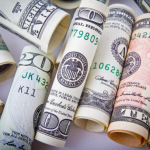When you check your credit card statement online or receive it in the mail, you probably notice it displays a minimum payment significantly lower than your total balance. You may even be tempted to pay it, since it reduces the dent in your pocketbook quite a bit compared to paying your balance in full. But should you? What are the consequences of paying only the minimum due? And what should you do when even minimum payments become a stretch?
What Is the Benefit of Making the Minimum Payment?
The minimum payment is a flexible option for credit card holders strapped for cash. Say you have an unusually tight month thanks to a couple unanticipated expenses. In this case, you will be grateful for the ability to pay the minimum rather than having to come up with enough to cover a larger chunk of your balance.
Put simply, the minimum payment is the least amount you can pay each billing cycle to avoid penalties, like late fees and delinquency. As Investopedia outlines, there are typically three ways creditors calculate minimum payments:
- A flat amount, like $35
- A low percentage of the existing balance, like 2%
- Interest charges and late fees plus a flat amount, like $20
The bare minimum you will be required to pay per billing cycle depends on the terms you agreed upon for each of your credit cards. If you are unsure, look over a previous statement or go back to the cardholder agreement you signed when you opened the card.
The benefits of making the minimum payment are two-fold: You will avoid late fees and you will avoid your account slipping into delinquency. This is a good start. But there is a cost to only paying the minimum, too. It will keep you in debt longer, because your remaining balance will just keep racking up interest.
And if minimum payments become a stretch, you are facing costly late fees. You will also start receiving collection notices, first from your credit card company and then from a collection agency if they sell your debt as a “charge off.”
Beyond Minimum Payments: Long-Term Debt Solutions
Many people are consistent with making at least minimum payments — until they are not. When hardship strikes, it can be difficult to even scrounge up enough to cover these bases, especially if you have a handful of credit cards with balances on them. Suddenly “just $35” multiplies by five and you are in over your head. Then the collection notices start and it is hard not to panic.
Missing a minimum payment once in a blue moon is not the end of the world; missing them consistently is usually a sign you are pretty deep in debt and unsure where to turn. So, what should you do?
According to Freedom Debt Relief reviews, one South Dakotan named Melissa found success with debt settlement after she “could not afford even minimum payments on all the debt [she] had gotten [herself] into.” She discusses having currently paid off three accounts, with a few payments left on two more, then just a final account remaining after that.
What can debt settlement do for people struggling to stay on top of minimum payments? Debt settlement can reduce the amount consumers owe per balance. People who enroll in a debt relief program, like Melissa did, will pay a certain amount each month into a special account. Then when they have saved up enough, negotiators reach out to their creditors to try to settle for a percentage of how much they originally owed. Creditors may accept a deal than risk getting nothing. It is important to note that this process will affect your credit score anytime you stop paying creditors directly, so you will have to weigh the pros and cons before enrolling.
One way to come up with funds to pay more than the minimum is to budget aggressively, then throw the savings at paying down your debts systematically, either from lowest balance to highest balance, or from highest interest rate to lowest interest rate. Anything you can pay over the minimum will help you chip away at your debt rather than growing it with interest.
When even minimum payments become a stretch, it is time to explore your options for debt relief, so you can get your finances back on track.







